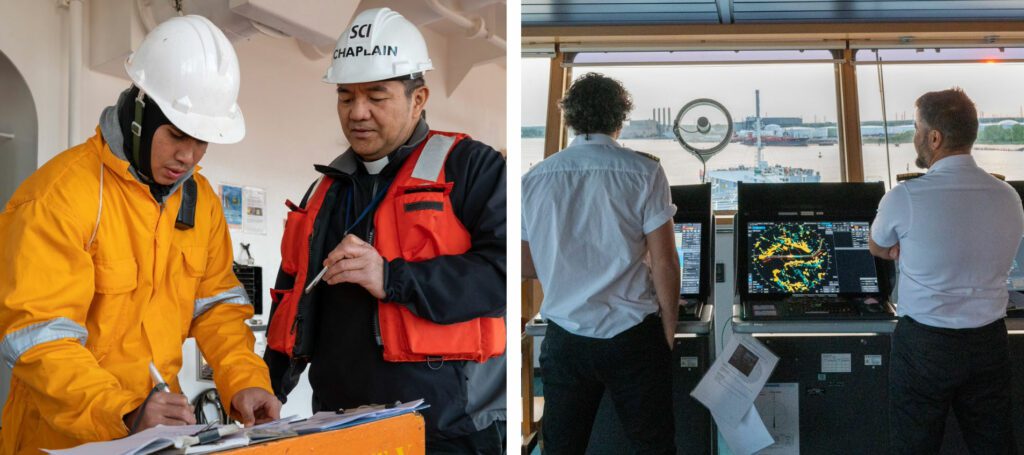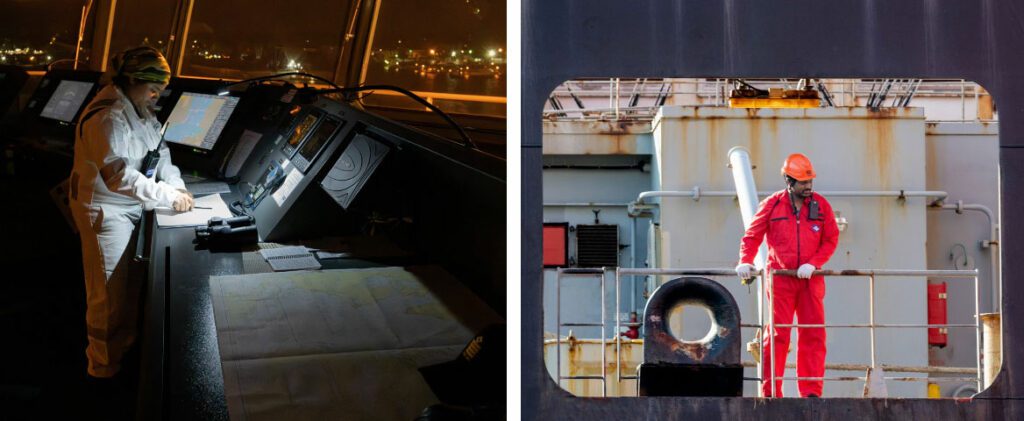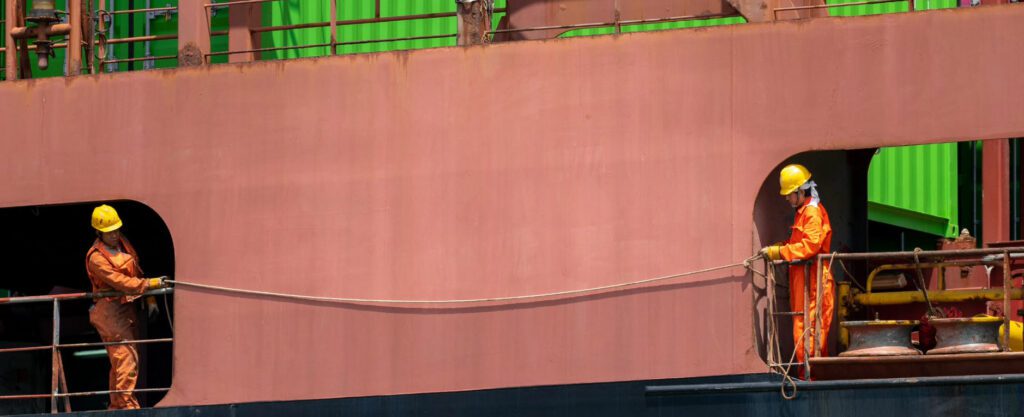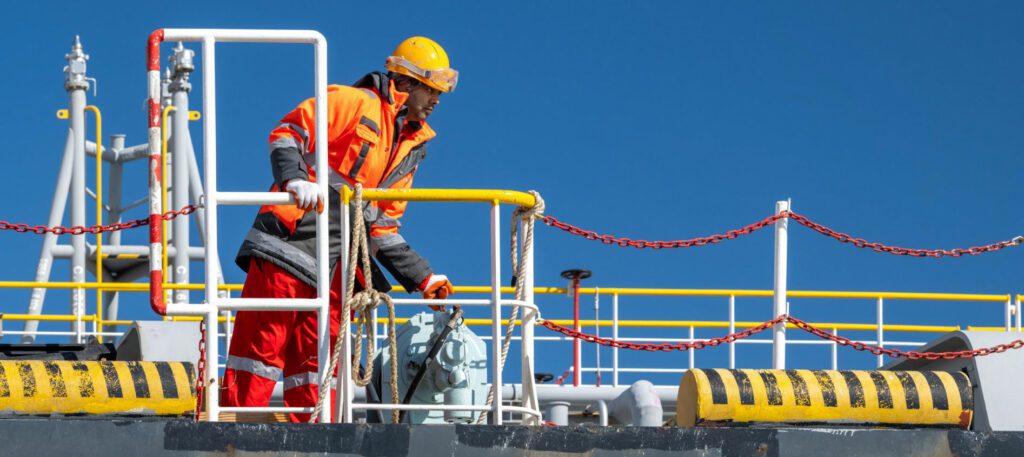Mental Health at Sea


Addressing and Managing Seafarer Mental Health Challenges
In partnership with the American P&I Club and its extensive experience in maritime insurance and risk mitigation, we offer this publication as one more lifeline of support: through it, we hope to provide insight into the mental health challenges that seafarers face—even the best and most seasoned of them—and how their fellow crewmembers, senior officers, ship owners, and ship operators can help. No ship leaves port without a lifeboat, and no vessel should take to the water without being equipped with a toolkit of mental health resources for its crew.
To view this page as a PDF, click here.
To read, click the headers below to expand that section.
Foreword and Acknowledgements

For almost two hundred years, the Seamen’s Church Institute (SCI) has focused exclusively on supporting and championing seafarers and mariners. More than just their occupation, we see these individuals who work on the water as professionals whose resilience and wellbeing are constantly tested through the work they do. On every contract, seafarers face prolonged separation from loved ones, grueling schedules, and often perilous weather, in addition to the myriad anxieties and stresses we all face in modern life. We all worry, and we all wish for safety and security for ourselves and our families. Seafarers are no different, yet they face their challenges while at sea, in an isolated and often risky environment.
So it is that, since its founding in 1834, the Seamen’s Church Institute has sought to care for mariners holistically: personally, professionally, socially, and emotionally. We now know that all of these factors come together to contribute to one’s mental wellbeing, and that staying mentally healthy is just as important as keeping physically fit.
In partnership with the American P&I Club and its extensive experience in maritime insurance and risk mitigation, we offer this publication as one more lifeline of support: through it, we hope to provide insight into the mental health challenges that seafarers face—even the best and most seasoned of them—and how their fellow crewmembers, senior officers, ship owners, and ship operators can help. No ship leaves port without a lifeboat, and no vessel should take to the water without being equipped with a toolkit of mental health resources for its crew.
This publication reflects the input and expertise of medical experts and academic authorities. We wish to offer our most sincere thanks to Martin Slade, MPH, PhD of the Yale School of Medicine, and Pam Kern, MS, LCSW for their review from the clinical perspective, and to Ira Douglas of Crowley Maritime, Captain Hedi Marzougui and Captain Morgan McManus for their valuable professional insights. We also thank William Moore, Dr Eng and Danielle Centeno of the American P&I Club for their close collaboration and many contributions. Thank you to my SCI colleague Naomi Walker, PhD for guiding the creation of this resource. Most of all, this brochure and all of SCI’s work is steered by the lived experience of our marine professionals. It is a privilege to serve them.
The Rev. Mark S. Nestlehutt
President & Executive Director, The Seamen’s Church Institute
Preface

As a global underwriter of marine liability risks, and as a Member of the International Group of P&I Clubs supporting and enabling world-wide trade, the American P&I Club regards the human element in shipping as critical and sees the highest levels of competency as an absolute priority. Key to this is not only the overall physical well-being but also the good mental health of seafarers. In a world where anxiety has become commonplace across all ages and professions, the hardship of serving on ocean going vessels for long periods of time, away from family and friends, has only added and compounded an already challenging environment for morale and mental wellbeing. The ever-increasing stresses of life are not only not ubiquitous on board ships, but often intensified.
With this in mind, it is imperative to the sustainability of our industry that we not only address the issues of training from a technical perspective, but that we address the issues that affect the psychology of seafarers. At the American P&I Club, this has been a focus historically with an array of tools, publications, videos, presentations and guides. As such, it is with great pleasure that the American P&I Club once again joins forces with the Seamen’s Church Institute (SCI) to provide this newest guide for its members and all maritime stakeholders, which focuses not only on the factors that can influence the state of mind of our people who work tirelessly within the world of sea commerce, but also highlights some of the actions we can take to protect them.
We are particularly proud to continue partnering with the Seamen’s Church Institute, who provide essential insight to these matters and who are dedicated to supporting seafarers through its mission of promoting safety, dignity and improved conditions through pastoral care, training, advocacy and thought leadership. This is a mission very much aligned with the core values of the American P&I Club and part of its own mission to serve its membership through applying best industry practices in loss prevention and risk control, and ultimately, concentrating on the most valuable resource of the industry, the human resource.
Congratulations to all who made this guide come to life!
Dorothea Ioannou
Chief Executive Officer, Shipowners Claims Bureau, Inc.
1. Introduction and scope
Objective
The objective of this document is to help seafarers and ship operators better understand the factors that contribute to mental health challenges for seafarers and what can be done to prevent and mitigate such effects on crews.
Seafaring can provide skilled and responsible individuals with excellent career prospects, good wages, long holidays, responsibility, travel opportunities, and job satisfaction. Conversely, there are certain aspects unique to the lives of mariners that can contribute to stress, causing reactions that can affect physical health, mental wellbeing, and workplace morale. Such stresses apply to mariners regardless of whether they are on long sea voyages, on coastal trading, or working aboard vessels on inland waterways.
In particular, extreme stresses can negatively impact mental wellbeing. Research has shown that seafarers suffer higher rates of mental health-related problems than do the general population and other working occupations. Furthermore, mental health conditions have a cost in productivity: for example, in 2022 the United States Department of Labor reported $193.2 billion in lost earnings per year in the United States alone due to mental health related issues.
If we know what contributes to mental health-related challenges, we can better prevent and mitigate their effects on our colleagues and crews. This guide examines some of the common contributors to poor mental health among seafarers and proposes various measures that can be taken to combat them. It is also intended to help seafarers and ship owners recognize if a crew member is undergoing a mental health crisis while aboard ship, offering initial recommendations for steps that senior officers may consider taking to manage the situation in cooperation with shore-based management and medical personnel.

Context, Environment, and Structure
Each ship and its crew are different. Crews are made up of individuals, all of whom will respond to their conditions and circumstances in various ways, personally and collectively. For example, tankers, bulk carriers, passenger ships, general cargo ships, and other ships, all experience challenges depending on a range of factors that include, but are not limited to, the cargoes carried, ship itineraries, and environmental conditions encountered while in transit. This publication focuses primarily on situations confronting seafarers sailing on international blue water voyages where the ship is underway and far from port.
2. Stressors on seafarers’ mental health and well-being
The world today is full of stressors. The events of recent years, including the global COVID-19 pandemic, the effects of climate change, and geo-political conflicts, have had profound effects on wellbeing in the general population. In 2022, the World Health Organization reported that rates of already-common conditions such as depression and anxiety had increased by more than 25% during the first year of the pandemic, adding to the nearly one billion people who were already living with a mental disorder.
Certain stressors are unique to life and work aboard ship and can potentially produce acute responses for seafarers. Furthermore, stressors can be exacerbated by and lead to fatigue and poor sleep. These include, but are not limited to:
SOCIAL STRESSORS:
- long periods of time spent away from family, friends, cultural norms, and professional resources such as therapists or psychologists;
- cross-cultural social and language barriers amongst crews that might create stress or increase isolation;
- the advantages and disadvantages of telecommunications and social media that may make seafarers aware of problems at home they cannot do anything about, possibly increasing a sense of helplessness. These communications can also exacerbate feelings of missing out on quality time with family and friends at home, making seafarers feel yet more isolated;
- a personality or culture of self-sufficiency or fear that may impact willingness to admit suffering or a need for help; and/or
- long working hours in a communal setting, in an environment where one can either feel stigma about saying one is struggling or feel it is more socially acceptable to push through and not ask for help.
WORKPLACE-RELATED STRESSORS:
- the 24/7 nature of life aboard ship that impacts one’s work/life balance and may diminish a seafarer’s opportunities for mental and physical relaxation when not working, due to difficulties detaching from the workplace;
- diminished access to resources or sources of support when exposed to unwanted behavior like bullying, cultural disparagement, or sexual harassment;
- the trend towards having fewer crew members, even on increasingly large ships, as a way to cut costs; and/or
- seafarers having to learn and be trained in a growing number of new technologies, implement complex regulations, and undergo the scrutiny of frequent inspections and ship audits.
PERSONAL STRESSORS:
- hidden, pre-existing unresolved trauma that the seafarer brings aboard ship. This can cause a seafarer to be triggered from past experiences, and undergo distress in the present that can negatively affect psychosocial functioning;
- concern for loved ones at home experiencing difficulties such as illness or conflict;
- stresses undergone by a cadet or seafarer away from home on a first maritime experience or contract; and/or
- the disconnect between how life on board has been imagined, and the reality of the experience.

ENVIRONMENTAL STRESSORS:
- navigating through heavily trafficked areas, or severe weather;
- time zone changes; and/or
- tunnel vision, no natural daylight inside the ship
OCCASIONAL EPISODIC TRAUMAS:
- fire, collision, grounding, or other threats to the crew or the ship’s integrity;
- witnessing a serious illness, severe injury, or death of a crew member aboard ship whether work-related, through natural causes, suicide, or homicide;
- acts of abuse, bullying, and harassment while on board;
- risks faced as a result of sailing through or close to conflict zones; and/or
- facing the threat or experiencing an attack of piracy or armed robbery.

Mental health concerns can surface to a greater or lesser degree even in situations where acute stress or trauma are not present. The daily challenges of life at sea can at times make it difficult for a seafarer to maintain good mental health. Much can be done, however, to manage the causes and the symptoms, if help is sought and provided in a timely manner.
The stigma associated with mental health care is a serious barrier to people seeking, providing, and receiving interventions and professional care at any time. This is not limited to seafarers: however the perception that seafarers are resilient can lead them to conceal emotional suffering, believing that it demonstrates a sign of weakness. They may also fear that they will lose their jobs if they are considered “damaged goods” by their employers or shipmates. It is therefore very important for seafarers and their employers to understand that acting upon mental health concerns in a timely manner is a strength and not a weakness – something that is to be encouraged for the good of crew members and companies alike.
Maritime stakeholders—such as ship owners, ship operators, shipmates, manning agents— should promote an environment where seafarers can safely disclose potential mental health concerns. The primary objective is for seafarers to reach out and be open to getting the mental health assistance that they need without fear of losing their jobs.
Cultural considerations. Seafarers comprise an international workforce with diverse cultures, religions, and languages. Cultural factors may contribute to whether a seafarer will seek help for mental health concerns. Seafarers may also have difficulty expressing strong feelings in a language other than their native language and to persons who are not intimately trusted such as close family members or friends.
Mental health awareness is spreading globally, and positive progress is being made, but mental health issues are still stigmatized in many cultures. These stigmas play a role in whether seafarers seek mental health assistance, as they may be concerned that it will impact their employability. Many seafarers are the primary wage earners supporting family members, communities.
3. Mental health support while aboard ship
The signs and symptoms that an individual is experiencing a mental health issue or crisis can include, but are not limited to:
Mental
confusion, disorientation, worry, intrusive thoughts and images, self-blame, experiencing “flashbacks” after traumatic events
Emotional
shock, sorrow, grief, sadness, fear, anger, irritability, guilt, shame, emotional numbness
Physical
overeating or loss of appetite, fatigue, headache, muscle tension, stomach ache, increased heart rate, exaggerated startle response, difficulty falling or staying asleep, problems with concentration

Behavioral
irritability, erratic “out of character” behavior, excessive use of TV or computer games (especially when this interferes with necessary rest hours), withdrawal from fellow crew members and friends, mood swings, detachment and estrangement from others, interpersonal conflict, violence, avoiding conversation, losing interest in previously pleasurable activities, startling easily or being jumpy, working too many hours
Intervention
If a crew member or senior officer suspects that a fellow seafarer is undergoing a mental health crisis, it is important to act quickly to prevent it worsening over time.
Try to engage them in the response by making them part of the process and solution. You can do this by talking to them, finding out what, if anything, is particularly troubling them, and attempting to gain their cooperation in approaching a senior officer. For example, you can ask, “What is coming up for you, or what are you feeling?”, or “Are you thinking of harming yourself or others?”. The company should consider being particularly prepared with timely and definitive response procedures should the seafarer answer “yes” to thinking of harming themselves or others.
Research has shown that it is also important to ask directly, “Are you thinking about suicide?” if you suspect that there may be even a slight chance that suicide is being considered. Although it may be a difficult question to ask someone, if they are considering suicide, they may feel relief that someone has brought up the subject and is willing to engage with them about it.
Even if they do not wish to involve anyone else, try to create a safety plan with them by identifying trusted people that they could approach to get help, either aboard ship or at home/shoreside. Additionally, inform someone on board to protect the crew member’s safety, since the severity of risk might not be known (e.g., Have they attempted suicide in the past? Are they suffering from a mental health condition? Have they run out of medication? etc.).

As a senior officer, if you are approached by one of your crew members about another individual, it is important to approach that individual in the first instance to try to gauge their mental state. Any concerns that you have should be immediately communicated to the relevant parties. Be aware that in some instances, an individual in acute distress will be unwilling to reveal it to anyone else and may try to conceal their true condition.
If you yourself are undergoing a mental health crisis, please reach out for help, whether it is someone on board and/or ashore that you know and trust, a shore-side confidential helpline, (such as helplines as found at the American P&I Club’s website by clicking here) or a representative in your ship owner’s or ship operator’s office.
4. Seeking professional assistance in evaluating concerns regarding a seafarer’s mental wellbeing during a crisis (decision factors)
If there is a need for professional mental health assistance for a crew member or oneself, it is recommended that the company’s safety management system (SMS) should clearly outline all available points of contacts and resources ashore and on board.
If you believe that a crew member on your ship requires professional care ashore, senior officers should contact a designated medical resource ashore and follow advice on how they should be cared for immediately either remotely and/or ashore. There, a decision can be made as to whether they should have a shore-side consult with a medical professional or be repatriated. If repatriated, the shipping company should coordinate with shoreside personnel and/or P&I claims executives to determine what the ongoing needs of the seafarer are once they return home.
When the need for professional mental health is indicated, it is a good practice for the ship owners and ship operators to assist the seafarer in obtaining such treatment. It is believed that seafarers who are able to safely disclose mental health struggles with the cooperation and assistance of the ship owner or ship operator and receive treatment become safer employees than those who suppress concerns for fear of lost income. With competent care and treatment, seafarers can return to work and be ready for productive employment while reducing the risk of future medical deviation and repatriation. Professional mental health care can be provided by qualified:
- Port chaplains, who are available in many ports to provide counseling and referrals to mental health care professionals
- Psychological care in port, which can be arranged in advance of a port call by ship’s operators and agents
- Telemedicine services while at sea, which are equipped to provide professional mental health care to seafarers
- Mental wellness outreach resource services available around the world can be found at the American P&I Club’s website by clicking here
- Hospitals in coordination with shoreside management and staff
5. Preventative measures and support resources
According to a recent study, the positive correlations for depression, anxiety, and suicidal ideation in seafarers include: lack of adequate training on how to respond to a mental health crisis aboard; an unaware or uncaring work environment; exposure to violence or threats of violence; co-existing medical conditions; low job satisfaction; ill health. Shipowners, ship operators and ships’ Masters can maximize a crew’s resilience and wellbeing by taking preventative measures and accessing support resources. For example:
- Ship owners and ship operators should establish a defined policy and relevant training for Masters, as well as the company’s crewing and human resources departments ashore to consider how to promote mental wellness for their shipboard crew members. This should include preventative measures (e.g., anti-bullying and anti-harassment training) identifying those who may be at risk, and coordinating between the Master and the company’s crewing and resource departments to properly manage any persons found to be at-risk on-board ship. Challenges for Masters to support their crew should also be identified and training provided that takes into consideration their own mental health issues, or cultural barriers and beliefs.
- Good internet access allows seafarers not only to communicate with their support network of friends and family at home, but could also enable communications with mental health resources and professionals. This could be kept confidential, giving crew members the access and opportunity they need to get help. Companies, labor unions, or other health care providers should be encouraged to consider providing a telemedicine mental health consult option to seafarers as part of their normal medical benefits if they are not normally provided by a socialized medical option from where the seafarers reside.
- Adding support structures amongst the crew, such as a buddy system or mentorship program whereby crew members are encouraged to actively support and check in with each other. This is particularly important to support those with limited sea experience and cadets. It is most likely that seafarers will turn to a fellow trusted crew member before approaching senior officers, so this could be an effective preventative strategy. Another avenue would be to ensure that crew members identify a designated person at home whom they would contact or who could be contacted if the need arose.
- Port chaplains visit many ships daily and quickly sense the individual and crew morale aboard ship. Even on the ships with the best morale, an individual seafarer can be preoccupied by a personal or back-home distraction and find it helpful to talk it through with a neutral third-party.
- Quality of food, opportunities for rest, hygiene, regular exercise, and positive team spirit strengthen the overall ship morale.
- Shore leave allows respite from the worksite, personal errands, and opportunity to “see the world.” Often, it can be difficult to take advantage of this due to short turnaround times in port or maritime security-related restrictions. The shore leave restrictions put in place because of the COVID-19 pandemic had a significant effect on seafarer wellbeing. Shore leave should be prioritized where possible, to allow seafarers to relax and decompress after time at sea.
- Drills and skills—from fire drills to anti-piracy and harassment prevention training— equip crew and empower them to respond to acute stressors. Policies and training to reduce bullying and harassment reduce behaviors that demean others and threaten their wellbeing. A well-trained seafarer becomes more confident and less stressed.
- Recognition and appreciation from shipowners and ship operators of the work their ship Masters and seafarers are doing. Recognition for service well done could be considered to boost morale.

Helpful ways for seafarers to foster good mental health on an individual level include:
- normalizing mental wellness as a natural extension of overall health and safety;
- maintaining a consistent schedule of rest and exercise, as well as having a healthy diet;
- communicating and spending time with other people for support;
- engaging in positive activities (e.g. sports, hobbies, listening to music, reading, regularly- scheduled religious services as may be applicable); and
- seeking confidential professional help or counseling where and when possible.
Appendix: Additional Resources
The American P&I Club’s brochure, What’s on Your Mind – Guidance for Seafarers’ Mental Health Awareness ̧ presents some of the common risk factors of a developing mental health condition and recommend measures to prevent or treat an occurrence on board.
The American P&I Club has established a list of global contacts of mental health hotlines and references. This list is periodically updated and can be found at the Club’s website by clicking here.
ISWAN’s brochure, Steps to Positive Health: Good Mental Health Guide for Seafarers includes practical steps seafarers can take to promote mindfulness and stress reduction via meditation and team cohesion can be found by clicking here.
ISWAN publication, Mentally Healthy Ships by Dr. Pennie Blackburn, Nov 2020 can be found by clicking here.
Critical Incident Stress Management (CISM) training is an intervention protocol that is sometimes called “psychological first aid”. It is used to help those who have undergone traumatic events, providing a structured process for sharing and processing their experiences, as well as suggesting referrals when further help is required. More information on CISM can be found by clicking here.
Applied Suicide Intervention Skills Training (ASIST) and safeTALK, sponsored by LivingWorks, approaches suicide risk like any other public health problem, attempting to de-stigmatize and normalize conversation about suicide. The ASIST method develops skills to ask a vulnerable person about suicide thoughts and, when acknowledged, to develop a joint plan to keep the suicidal personal safe for now. The two-day ASIST training is recommended for every ship’s medical officer. More information regarding ASIST can be found on their website by clicking here.
The Psychological First Aid Field Operations Guide published by the National Child Traumatic Stress Network (NTSN) and National Center for Post-Traumatic Stress Disorder (PTSD) provides extensive guidance and training in psychological first aid for first responders to disaster- affected communities that are adaptable to seafarers’ exposure to extreme stress. More information can be found the NTSN’s website by clicking here.
Further joint industry guidance on mental health for the shipping industry:


